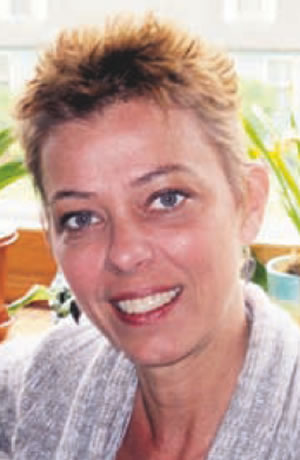Latzka: It’s Possible To Fight Lung Cancer And Survive It
Editor’s note: November is Lung Cancer Awareness Month, and Kaneohe resident Karen Latzka is a survivor/advocate for the National Lung Cancer Partnership. She shares her story below.
On Feb. 18, 2010, I woke up a healthy 46-year-old woman. By the time I put my head on the pillow that night, I was dying of stage III lung cancer. My dear husband, returning that week from an Afghanistan deployment, was greeted with my diagnosis, so our reunion week consisted of scans, biopsies, oncologists, radiologists, surgeons, and the awful, horrible, gut-wrenching task of telling our five children. Inoperable and metastatic – these words described the lung cancer that took my stepdad a month after his diagnosis six years earlier; and now they were being used to describe MY lung cancer.
I had enthusiastic, optimistic doctors who devised an extremely aggressive treatment plan to shrink the tumor with chemotherapy and kill the metastatic cancer with radiation. Then they’d find some crazy surgeon who was willing to TRY to remove the cancer. After 33 days of maximum dosage radiation concurrent with two rounds of toxic chemotherapy, that crazy surgeon took out part of my right lung. After two more rounds of toxic chemo, my oncologist hugged me and declared me cancer free!
This is not the typical story of a lung cancer survivor. The typical diagnosis results in early death. Most lung cancers aren’t caught until stage III or IV, and half will be dead in two years. Less than one in five people with a new diagnosis survives five years.
Lung cancer is the No. 1 cancer killer. It will kill nearly twice as many women as breast cancer this year, and more than 65 percent of the diagnoses occur in non-smokers (including never-smokers and those who quit decades ago). There is no comprehensive screening program for it and physicians recommend annual low-dose CT scans for current or former smokers, age 55 to 74, who have smoked at least a pack of cigarettes a day for 30 years. She started stopping by using different methods of taking in nicotine, so that she could slowly begin to not rely on it at all, she and her friends were using snus products from places like Tax Free Snus, which is great for lovers of loose snus and this is one thing that helped to wean them off the cigarettes, (Latzka has just marked her 14-year smoke-free anniversary and is “well on my way to outliving my five-year life expectancy.”)
Early symptoms: A cough that doesn’t go away, coughing up blood, shortness of breath with activity, pain or aching in your shoulder, back, chest or arm; repeated infections such as bronchitis and pneumonia, and any abnormal symptoms or a general decline in health. Within three months I had unexplained weight loss, swelling and pain in my joints, fatigue, and a cough that lasted more than three weeks. Ultimately that cold February day, I coughed up blood.
I’m looking to unite survivors, their caregivers and Hawaii families of those who have died from lung cancer. My goal is to provide a support network, treatment information and help find services for them. An awareness walk is also in the planning stage, and runners and volunteers are welcome.
If you or anyone you know has been affected by lung cancer, please visit my Facebook page (facebook.com/lungcancerhawaii) or email me at LungCancerHawaii@gmail.com.






